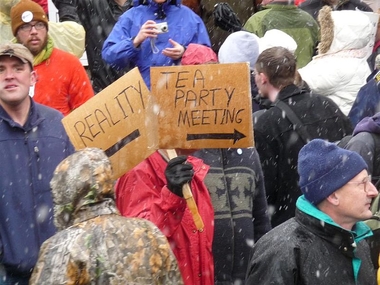Proposed No. Carolina resolution rejects federal courts

MARTHA WAGGONER, Associated Press
RALEIGH, N.C. (AP) — A pair of North Carolina legislators has introduced a resolution asserting the state can make its own laws regarding the establishment of religion and that the federal government and courts have no authority to decide what is constitutional.
The resolution, filed by two Republicans from Rowan County, declares "each state is sovereign and may independently determine how the state may make laws respecting an establishment of religion."
The resolution is titled "A Joint Resolution to Proclaim the Rowan County, North Carolina Defense of Religion Act of 2013." It goes beyond religion to claim federal court rulings on any constitutional issue have no authority in the states.
" ... the power to determine constitutionality and the proper interpretation and proper application of the Constitution is reserved to the states and to the people," the resolution states, invoking the Tenth Amendment.
The resolution is nothing more than political grandstanding, said Marci Hamilton, church-state expert at the Benjamin N. Cardozo School of Law in New York City. "Were they to pass this bill, it would be unconstitutional and nothing but the subject of litigation," she said. "It would take the federal courts about five minutes to hold that it's unconstitutional."
She said it concerned her because elected officials must pledge to uphold the federal and state constitutions. "It does show me that the elected officials are willing to pander to what they perceive as their voters, regardless of what the Constitution requires," she said.
The bill's primary sponsors are Reps. Harry Warren and Carl Ford, a tea party member. Eleven other legislators signed on to the resolution. Legislators introduce scores of resolutions every year, honoring constituents or declaring their stances on issues, but they carry little legal weight. But Hamilton said a resolution could still be unconstitutional if it was considered a government endorsement of a particular religion. The resolution does not specify any religion.
Warren said in a statement that the bill was only intended to allow Rowan County officials to open their meetings with prayer, not to establish a state religion. Ford did not immediately return a call seeking comment.
The House Rules chairman said Wednesday that the bill won't be considered in its current form. Rep. Tim Moore, R-Cleveland, said he didn't believe it was the intent of the bill's sponsors to let the state create or sanction a religion, but rather to express opposition to a lawsuit they perceived to infringe on religious freedom.
In March, the American Civil Liberties Union of North Carolina sued the board of commissioners in Rowan County. The federal lawsuit accuses the board of violating the First Amendment ban on establishment of religion by routinely praying to Jesus Christ to start its meetings.
Chris Brook, legal director of the state chapter of the American Civil Liberties Union, said the lawmakers don't understand constitutional law and principles of separation of powers.
"These are principles that have served our nation well for hundreds of years," he said. "And it is unfortunate that these elected officials would seek to throw these hallowed principles overboard because they don't like the results they produce in one case."
The bill asks the House and Senate to concur with these conclusions: that the U.S. Constitution "does not prohibit states or their subsidiaries from making laws respecting an establishment of religion" and that the Legislature "does not recognize federal court rulings which prohibit and otherwise regulate the State of North Carolina, its public schools or any political subdivisions of the State from making laws respecting an establishment of religion."
Hamilton described the bill as a waste of time, money and resources. "It is part of our current culture that some religious believers are arguing that they don't have to obey the law," she said. "But when it's our election officials saying they don't have to obey the federal Constitution, it's very sad."
Michael Gerhardt, a constitutional law professor at the University of North Carolina at Chapel Hill, said the resolution likely would have only symbolic meaning and no legal significance.
"Resolutions usually mean nothing more than a belief, and these lawmakers are entitled to have that belief," he said.
He compared the arguments to those used to assert states' rights in defending slavery.
"If it's supposed to be substantive, then that's a constitutional problem," he said. "Whatever their beliefs may be, they were resolved by the Civil War" and by Supreme Court, federal court and state court decisions.
___
Online:
The proposed resolution: http://www.ncleg.net/gascripts/BillLookUp/BillLookUp.pl?Session=2013&Bil...
___
Martha Waggoner can be reached at http://twitter.com/mjwaggonernc





